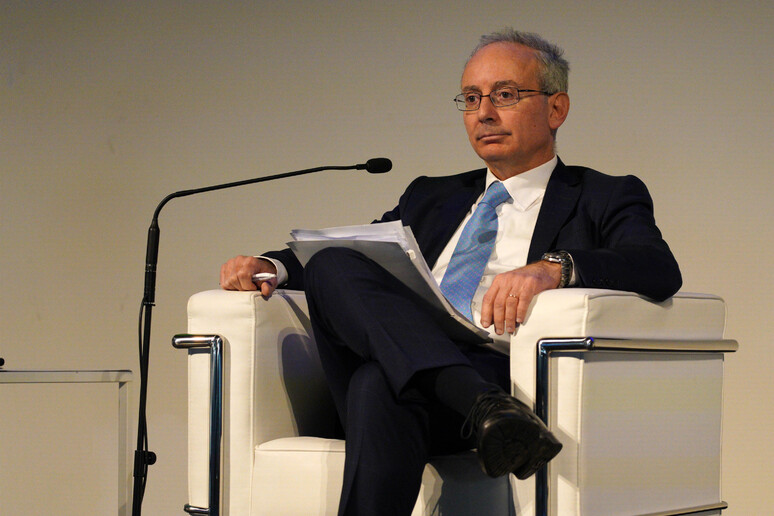"The decision should be
interpreted as a political and moral message more than 25 years
after the end of the war and 20 years after the Thessaloniki
European Council that had paved the way for enlargement policies
to the Balkans. But it also represents an injection of
confidence for the population and civil society, especially
looking at the younger people who unfortunately continue to
leave the country because of the absence of solid prospects. The
decision also encourages the new legislative and executive
authorities to pursue the path of reform without delay."
Further delays "could, on the other hand, have reinforced
feelings of disaffection and distrust toward the EU, creating
spaces for further penetration by third-party actors who have
agendas that do not coincide with the European one," the
ambassador explained, going on to stress the importance of the
reform process, which is necessary for the country's progress
and stability. And the EU goal could also become a "glue between
political forces and different ethnoreligious components for
responsible government actions that respect the general
interest."
Bosnia, at the same time, still faces internal difficulties. Di
Ruzza underlined "the issue of forming the new government of the
Federation of Bosnia and Herzegovina."
Then there is also the long-standing issue of the failure to
adopt "constitutional amendments to implement the 2009 ruling of
the European Court of Human Rights on the Sejdic-Finci case,"
which should rule out discrimination affecting, in the political
sphere and representation, those who do not belong to one of the
three constituent peoples. But work still needs to be done on
the "serious and widespread phenomena of corruption, reforms on
conflict of interest and the rearrangement of the judiciary's
self-governing body. Reconciliation processes must also be
encouraged at all levels. Recently, we supported a project with
a strong symbolic value launched by the District of Bricko, the
inauguration of a monument dedicated to all the victims of the
war. There are very few examples of this kind in a country that
tends to favor selective commemorations of the martyrs of that
brutal conflict."
From an economic perspective, among the priority areas of
intervention, "I would mention the energy sector, particularly
the renewable energy sector, which is essential to combat air
pollution."
Generally, "the country's growth prospects remain closely
intertwined with resolving political and social problems. The
implementation of the most urgent reforms is hence a priority
not only from the perspective of the accession process but also
to build a solid and credible future for the country and its
youth."
In this framework, Italy can play a crucial role. "Italy," Di
Ruzza explained, "continues to be among the most convinced
supporters of the integration process. The bilateral
relationship with Bosnia and Herzegovina is key to bringing the
country closer to Europe. In this regard, "the Italian-led
European twinnings" and "the actions of our Development
Cooperation and AICS" on a variety of sectors, such as "health,
phytosanitary, sustainable tourism development, inclusive
education, enhancement and protection of environmental heritage
and biodiversity, cooperation with police forces, and the fight
against organized crime, should not be forgotten." And "we are
proud to have succeeded in restarting the project of the Museum
of Contemporary Art "Ars Aevi," designed by Renzo Piano, which
seemed to have been hopelessly blocked for years." Not
forgetting, "the economic dimension," with Italy being "the
leading exporter and among the absolute top trading partners and
the Italian system producing about 12 thousand jobs."
In addition to the desire for the EU, Bosnia feels the desire
for rapprochement with Nato, well seen in Sarajevo, despite the
opposition of the Bosnian Serbs. "The war in Ukraine has once
again confirmed the importance and mutual benefits for
Bosnia-Herzegovina and Europe of a stable inclusion of that
country in the European security architecture: in this sense,
the Euro-Atlantic integration path, which must rely on the
aspirations of the Bosnian-Herzegovinian people and the
democratic will of their government, maybe the compass of
Bosnian foreign policy," Di Ruzza said.
However, "the Nato issue continues to appear politically
controversial and divisive. Therefore, at the moment," the
ambassador added, "I think the main goal should be more about
consolidating the partnership between Nato and Bosnia and
Herzegovina. From this standpoint, the confirmation of Deputy
Foreign Minister Josip Brkic as head of the relevant
governmental commission offers a fruitful sign of continuity
with the work of the previous executive."
ALL RIGHTS RESERVED © Copyright ANSA





